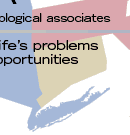






NEPA Voices represents the philosophy and orientation of the writer.
The contributions do not represent the NEPA members as a whole.
The contributions do not represent the NEPA members as a whole.
mind · body · spirit insights
From time-to-time I come upon interesting and inspirational information that can nourish your mind, body and spirit. I would like to share them with those of you who are like-minded and will be posting on a weekly basis. I believe you will find my Insights meaningful.
You can also join my mailing list and receive emails when new Insights are posted. Please fill out the form on my personal website. I hope you will choose to share them with your friends and invite them to also join my Mind · Body · Spirit Insights mailing list.
— Dr. Marlene Kasman
Choosing a Therapist: Psychiatrist or Psychologist
07/08/2013
The term “psychologist” and “psychiatrist” are often used interchangeably to describe a person who conducts psychotherapy. In fact,these two professions are not interchangeable. There are significant differences between these professional roles. Examining the educational background required for each profession can be helpful in understanding their differences.
Psychiatrists go to medical school like other physicians. After three or four years they receive their M.D. degree. They spend the next four years in a residency which generally includes inpatient and outpatient rotations in general medicine, family medicine, pediatrics, neurology, and psychiatry. This residency does not usually include specific training in psychology and psychotherapy. After they complete their residency and pass the state board exam, these physicians can obtain a license to practice. As physicians, they are able to prescribe medicine and admit patients to hospitals.
Clinical Psychologists typically spend five to seven years receiving graduate training in psychology in order to obtain a doctoral degree, (most commonly a Ph.D. but may be a Psy.D. or an Ed.D.), in clinical or counseling psychology. Psychology is the study of people: how they think, act, react, and interact. All course work is related to understanding every aspect of human behavior and the thoughts, feelings, and motivation underlying this behavior. Two years of supervised clinical experience follow receipt of the doctorate degree when candidates are trained to diagnose, perform psychotherapy, and help people understand themselves and address their emotional issues. Following these two years of clinical experience, they may take the state licensing exam. Only after they have met the above requirements and passed the state licensing exam are they able to practice clinical psychology and call themselves a “psychologist.”
Some psychologists and psychiatrists go on to receive further specialized training after attaining their Ph.D. or M.D. Degrees. Advanced programs in child, adolescent, family, marriage and couples therapy, group psychotherapy, psychoanalytic psychotherapy, and behavioral and cognitive therapy may require at least one to three years of additional coursework and supervision. A clinician who has obtained one or more Certificates in advanced training programs is among the most highly trained mental health professionals.
Psychotherapy is conducted with individuals, groups, couples, and families. Psychotherapists help people to overcome stress, emotional problems, relationship problems, and troublesome habits. Psychologists treat people by providing psychotherapy focused on helping people understand the root of their problems and what they can do to change destructive behaviors, grow emotionally, and enhance their lives. Most psychiatrists in private practice focus on symptom relief using medicine to correct chemical imbalances that affect their clients. Most psychologists do not prescribe medicine. However, some psychologists who have taken advanced training in psychopharmacology can prescribe medicine as a part of their psychotherapy treatment.
Psychiatrists go to medical school like other physicians. After three or four years they receive their M.D. degree. They spend the next four years in a residency which generally includes inpatient and outpatient rotations in general medicine, family medicine, pediatrics, neurology, and psychiatry. This residency does not usually include specific training in psychology and psychotherapy. After they complete their residency and pass the state board exam, these physicians can obtain a license to practice. As physicians, they are able to prescribe medicine and admit patients to hospitals.
Clinical Psychologists typically spend five to seven years receiving graduate training in psychology in order to obtain a doctoral degree, (most commonly a Ph.D. but may be a Psy.D. or an Ed.D.), in clinical or counseling psychology. Psychology is the study of people: how they think, act, react, and interact. All course work is related to understanding every aspect of human behavior and the thoughts, feelings, and motivation underlying this behavior. Two years of supervised clinical experience follow receipt of the doctorate degree when candidates are trained to diagnose, perform psychotherapy, and help people understand themselves and address their emotional issues. Following these two years of clinical experience, they may take the state licensing exam. Only after they have met the above requirements and passed the state licensing exam are they able to practice clinical psychology and call themselves a “psychologist.”
Some psychologists and psychiatrists go on to receive further specialized training after attaining their Ph.D. or M.D. Degrees. Advanced programs in child, adolescent, family, marriage and couples therapy, group psychotherapy, psychoanalytic psychotherapy, and behavioral and cognitive therapy may require at least one to three years of additional coursework and supervision. A clinician who has obtained one or more Certificates in advanced training programs is among the most highly trained mental health professionals.
Psychotherapy is conducted with individuals, groups, couples, and families. Psychotherapists help people to overcome stress, emotional problems, relationship problems, and troublesome habits. Psychologists treat people by providing psychotherapy focused on helping people understand the root of their problems and what they can do to change destructive behaviors, grow emotionally, and enhance their lives. Most psychiatrists in private practice focus on symptom relief using medicine to correct chemical imbalances that affect their clients. Most psychologists do not prescribe medicine. However, some psychologists who have taken advanced training in psychopharmacology can prescribe medicine as a part of their psychotherapy treatment.
What Do We Owe Our Children?
06/26/2013
What do we owe our children? Are we wrong to spend our time and money on ourselves when our children are having hard times? These questions come up for discussion over and over again among parents of adult children.
Some of these parents are part of the self made generation who started with little and became successful through years of thrift and hard work. Some pursued higher education and paid for it themselves, others did not go to college. Their goal was to give their children the comforts and advantages that they missed when they were growing up. They reminisce about their immigrant parents and are proud of their own independence and that, on their own, they became more successful than their parents. They are critical of their adult children who seem to feel entitled to the luxuries that their parents waited for for many years. Parents seem unaware that by rescuing and indulging, they helped to mold their children into adults who are less resilient when they fall on hard time. Unlike the parent’s generation, their adult children are not as independent and are quite comfortable asking for childcare help or for money to help them maintain their expensive lifestyles.
Some parents of the senior generation have trouble giving to themselves long after the financial necessity of counting pennies has past. The other day I spoke with an 90 year old woman who was wracked with guilt at the thought of spending some of her dwindling financial resources on her own medical needs at a time when her married child’s business was slow. She was quite able to empathize with his financial concerns, but did not feel entitled to expenditures for herself that she would consider luxuries, but were truly necessities. This was very disturbing to me.
So what do we owe them? One excellent answer came from Jonas Salk. He said “Good parents give their children roots and wings.” Roots give them a knowledge of home and keep them grounded through tough times, and wings recognize the need for autonomy so that they feel comfortable venturing out into the world and maybe even flying farther than we ever did. Perhaps as we recognize their strengths and encourage their autonomy, we can develop a more mutual relationship with our adult children.
Some of these parents are part of the self made generation who started with little and became successful through years of thrift and hard work. Some pursued higher education and paid for it themselves, others did not go to college. Their goal was to give their children the comforts and advantages that they missed when they were growing up. They reminisce about their immigrant parents and are proud of their own independence and that, on their own, they became more successful than their parents. They are critical of their adult children who seem to feel entitled to the luxuries that their parents waited for for many years. Parents seem unaware that by rescuing and indulging, they helped to mold their children into adults who are less resilient when they fall on hard time. Unlike the parent’s generation, their adult children are not as independent and are quite comfortable asking for childcare help or for money to help them maintain their expensive lifestyles.
Some parents of the senior generation have trouble giving to themselves long after the financial necessity of counting pennies has past. The other day I spoke with an 90 year old woman who was wracked with guilt at the thought of spending some of her dwindling financial resources on her own medical needs at a time when her married child’s business was slow. She was quite able to empathize with his financial concerns, but did not feel entitled to expenditures for herself that she would consider luxuries, but were truly necessities. This was very disturbing to me.
So what do we owe them? One excellent answer came from Jonas Salk. He said “Good parents give their children roots and wings.” Roots give them a knowledge of home and keep them grounded through tough times, and wings recognize the need for autonomy so that they feel comfortable venturing out into the world and maybe even flying farther than we ever did. Perhaps as we recognize their strengths and encourage their autonomy, we can develop a more mutual relationship with our adult children.
Mind Body Connection
06/18/2013
Your emotional, social, and spiritual state has been proven to have a significant impact on your physical health. Stressful events like birth of a new baby, retirement or loss of a job, money problems, divorce, or the death of a loved one often seem linked with the occurrence of physical symptoms. We hear about people who have heart attacks soon after retirement or the development of serious illnesses following a major life change. Students cramming for final exams frequently get sick. Our immune system is weakened and we are more susceptible to illness during those times when we are feeling anxious or upset.
Research has demonstrated that the use of stress reducing techniques can lower blood pressure and stress hormone levels, relieve pain and improve immune functioning. Mind Body medicine has also improved clinical conditions such as HIV, cancer, insomnia, anxiety, depression and post traumatic stress disorder (PTSD). There is even preliminary evidence that muscles in the body can be toned and strengthened through mental exertion.
You can learn to use your thoughts to positively influence some of your body’s physical responses, thus reducing your level of stress. Research has shown that when a person recalls or imagines a happy experience his body and mind tend to relax. On the other hand, when she recalls or imagines a frightening experience, her heart beats faster, her hands may become cold and clammy, and she may begin to sweat.
Below are some relaxation exercises that can help you use the power of your mind to reduce anxiety and promote an increased sense of well being. They do not take the place of needed medical treatment, but they do have powerful psychological benefits.
Relaxed Breathing
Sit or lie down in a comfortable place. Slowly take a deep breath through your nose, hold it, and then slowly, breathe out through your mouth. Focus on your breathing and breathe in a regular rhythm counting from one to five each time you inhale and exhale. Practice this relaxed breathing for 5 minutes two times a day or whenever you feel stressed.
Progressive Muscle Relaxation
Mind Relaxation
Close your eyes. Breathe normally through your nose. As you exhale, say a word or phrase such as “calm” or “I feel peaceful.” Continue for 10 minutes. If your mind wanders, remind yourself to think about your breathing and the word that you have chosen. Keep your breathing slow and steady.
* * *
There are many other tools that trained professionals utilize to help calm you and help you deal with pain and stress. Exercise, yoga, massage, meditation, and guided imagery can also be used to enhance the mind-body connection.
Research has demonstrated that the use of stress reducing techniques can lower blood pressure and stress hormone levels, relieve pain and improve immune functioning. Mind Body medicine has also improved clinical conditions such as HIV, cancer, insomnia, anxiety, depression and post traumatic stress disorder (PTSD). There is even preliminary evidence that muscles in the body can be toned and strengthened through mental exertion.
You can learn to use your thoughts to positively influence some of your body’s physical responses, thus reducing your level of stress. Research has shown that when a person recalls or imagines a happy experience his body and mind tend to relax. On the other hand, when she recalls or imagines a frightening experience, her heart beats faster, her hands may become cold and clammy, and she may begin to sweat.
Below are some relaxation exercises that can help you use the power of your mind to reduce anxiety and promote an increased sense of well being. They do not take the place of needed medical treatment, but they do have powerful psychological benefits.
Relaxed Breathing
Sit or lie down in a comfortable place. Slowly take a deep breath through your nose, hold it, and then slowly, breathe out through your mouth. Focus on your breathing and breathe in a regular rhythm counting from one to five each time you inhale and exhale. Practice this relaxed breathing for 5 minutes two times a day or whenever you feel stressed.
Progressive Muscle Relaxation
- Progressive muscle relaxation involves sequentially tensing and then relaxing specific muscle groups in the body, one at a time, and progressing throughout the entire body.
- The key to this exercise is to tighten a specific muscle group for at least 5 seconds until you feel the tension, and then release the muscles for 10 seconds, noticing the difference in how the muscles feel before and after the exercise.
- You can start by relaxing the muscles in your legs and feet, working up through each muscle group to your neck, shoulders, and scalp.
Mind Relaxation
Close your eyes. Breathe normally through your nose. As you exhale, say a word or phrase such as “calm” or “I feel peaceful.” Continue for 10 minutes. If your mind wanders, remind yourself to think about your breathing and the word that you have chosen. Keep your breathing slow and steady.
* * *
There are many other tools that trained professionals utilize to help calm you and help you deal with pain and stress. Exercise, yoga, massage, meditation, and guided imagery can also be used to enhance the mind-body connection.
★ Trust
06/11/2013
Researchers have found that the capacity to develop intimate relationships is highly influenced by the kind of relationships the child had early in life. The ability to trust is basic to any relationship. Trust comes more easily for some people than for others depending upon their past experiences. A child who successfully develops trust will feel safe and secure in his world. Those who are unable to develop trust are more likely to view their world as inconsistent and unpredictable.
Learning to trust begins at birth. Eric Erikson describes this as the most fundamental stage in a person’s psychological development. Babies are born completely helpless and dependent upon their caregivers for food, shelter, comfort and love. When a baby’s cries are responded to in a loving, attentive, and consistent manner, he will feel safe and learn to trust his environment. This kind of positive parent-child relationship teaches him that he can communicate in order to get his needs met. If instead, his parents are inconsistent, rejecting or emotionally unavailable, he is more likely to feel mistrust and may carry a sense of shame and inadequacy into his adult relationships.
Trust is the cornerstone of a meaningful and lasting relationship. When you trust someone, you believe that he will be honest, loyal, and faithful and will not abandon you. You believe that she will forgive you and accept you unconditionally. You think of your partner as your ally, not your foe. Only when you feel safe with your partner will you be willing to be authentic and vulnerable.
Previous hurts and losses can interfere with a person’s ability to trust and be honest in a relationship. The adult whose childhood relationships were painful will be more likely to view situations that others would perceive as innocuous through a lens of mistrust. The wounds of an adult who has been betrayed by someone she loved, admired and trusted will take time to heal. It is not easy, but regardless of the past, people do have the capacity to recover and trust again. Sometimes while recovering from a hurtful relationship, a person will develop greater personal strength, self awareness and the capacity for more fulfilling relationships.
Childhood and Society, Erik Erikson
Learning to trust begins at birth. Eric Erikson describes this as the most fundamental stage in a person’s psychological development. Babies are born completely helpless and dependent upon their caregivers for food, shelter, comfort and love. When a baby’s cries are responded to in a loving, attentive, and consistent manner, he will feel safe and learn to trust his environment. This kind of positive parent-child relationship teaches him that he can communicate in order to get his needs met. If instead, his parents are inconsistent, rejecting or emotionally unavailable, he is more likely to feel mistrust and may carry a sense of shame and inadequacy into his adult relationships.
Trust is the cornerstone of a meaningful and lasting relationship. When you trust someone, you believe that he will be honest, loyal, and faithful and will not abandon you. You believe that she will forgive you and accept you unconditionally. You think of your partner as your ally, not your foe. Only when you feel safe with your partner will you be willing to be authentic and vulnerable.
Previous hurts and losses can interfere with a person’s ability to trust and be honest in a relationship. The adult whose childhood relationships were painful will be more likely to view situations that others would perceive as innocuous through a lens of mistrust. The wounds of an adult who has been betrayed by someone she loved, admired and trusted will take time to heal. It is not easy, but regardless of the past, people do have the capacity to recover and trust again. Sometimes while recovering from a hurtful relationship, a person will develop greater personal strength, self awareness and the capacity for more fulfilling relationships.
Childhood and Society, Erik Erikson
Perfectionism
05/27/2013
Most of us would consider having high standards a good thing. It reflects ambition and a desire for success. The perfectionist, however, sets unrealistically high standards that often cannot be met, can rob him of personal satisfaction, and can actually interfere with success. Most perfectionists learned early in life that they were valued by how much they achieved. For them, life was an endless report card. Instead of developing their own inner self worth, they learned to value themselves on the basis of other people’s approval.
The truth is that no one succeeds at becoming "just right," free of flaws and failings. Growth is a lifelong process and criticizing ourselves just slows it down and keeps us unhappy. Balancing honest appraisal with self acceptance each day can open up possibilities for change without shame and negativity.
I would like to share some interesting quotations on this subject.
“Perfectionism is self-abuse of the highest order.”
― Anne Wilson Schaef
"It is failure that guides evolution; perfection provides no incentive for improvement, and nothing is perfect.”
― Colson Whitehead, The Intuitionist
"When you stop expecting people to be perfect, you can like them for who they are.”
― Donald Miller, A Million Miles in a Thousand Years: What I Learned While Editing My Life
"Perfection is not a destination; it's a never-ending process...Enjoy!”
― Jim Bouchard, Think Like a Black Belt
“Stop waiting for the perfect day or the perfect moment... Take THIS day, THIS moment and lead it to perfection.”
― Steve Maraboli, Unapologetically You: Reflections on Life and the Human Experience
The truth is that no one succeeds at becoming "just right," free of flaws and failings. Growth is a lifelong process and criticizing ourselves just slows it down and keeps us unhappy. Balancing honest appraisal with self acceptance each day can open up possibilities for change without shame and negativity.
I would like to share some interesting quotations on this subject.
“Perfectionism is self-abuse of the highest order.”
― Anne Wilson Schaef
"It is failure that guides evolution; perfection provides no incentive for improvement, and nothing is perfect.”
― Colson Whitehead, The Intuitionist
"When you stop expecting people to be perfect, you can like them for who they are.”
― Donald Miller, A Million Miles in a Thousand Years: What I Learned While Editing My Life
"Perfection is not a destination; it's a never-ending process...Enjoy!”
― Jim Bouchard, Think Like a Black Belt
“Stop waiting for the perfect day or the perfect moment... Take THIS day, THIS moment and lead it to perfection.”
― Steve Maraboli, Unapologetically You: Reflections on Life and the Human Experience